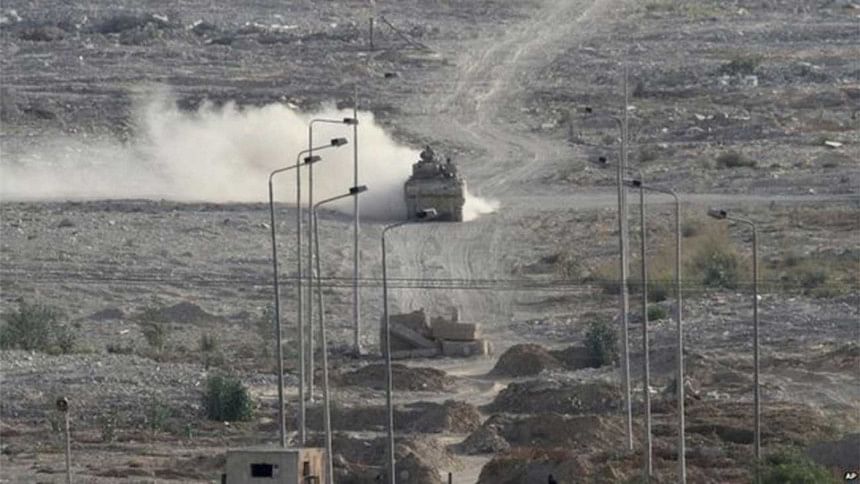Egypt vows to pursue IS in Sinai

Egypt says its army will continue an offensive in the Sinai Peninsula, after clashes with Islamic State (IS) militants left more than 100 dead.
Operations will not stop until the area is cleared of all "terrorist concentrations", the army said.
Air strikes continued into the early hours of Thursday.
The army says 17 soldiers were among those killed after militants launched near-simultaneous raids on military checkpoints in Sheikh Zuweid and Rafah.
Local reports put army casualties higher.
The attack was one of the largest co-ordinated assaults in the area yet by IS's local affiliate, Sinai Province. The peninsula has been under a state of emergency and a curfew since October, when dozens of soldiers were killed in a militant attack.
Separately on Wednesday, security officials said nine members of the now banned Muslim Brotherhood, including former MP Nasr al-Hafi, had been killed in a police raid on a flat in western Cairo.
The security situation in Egypt has worsened since the assassination of the public prosecutor, Hisham Barakat, three days ago in the capital.
Analysts said the car bomb attack that killed Barakat also bore the hallmarks of Sinai Province, which was known as Ansar Beit al-Maqdis until it pledged allegiance to Islamic State in November and changed its name.
'100% under control'
In a statement, the army said it had killed "100 members of the terrorist elements" and injured them in "large numbers" in fighting in North Sinai.
It said the operation left 17 soldiers, including four officers, dead.
By late on Wednesday, an army spokesman said the situation was "100% under control" and militants had withdrawn from Sheikh Zuweid.
Brig Mohamed Samir said: "The forces on the ground are completely under control. The group who were captured are being interrogated by the investigation team."
Eyewitness earlier reported seeing militants roaming the streets of the northern town of Sheikh Zuweid, clashing with armed forces. Five army checkpoints were also targeted by car bomb attacks.
The town's main police station came under mortar and RPG fire, and militants reportedly planted bombs along a road leading to a nearby army camp.
Egypt sent F-16s jets to bombard the militants in several locations.
Israeli PM Benjamin Netanyahu said his country sent its "condolences to the government and people of Egypt for the fallen Egyptians slain by IS terror".
He added: "We see IS at the gates, across the border in the Golan, across the border in Egypt... We must stand up to all the forces of militant Islam, those led by Iran, those led by IS."
Since October, police and army patrols have been stepped up to deal with militancy in Sinai - which has been on the rise since the military overthrew Islamist President Mohammed Morsi in July 2013. At least 600 police and armed forces personnel have since been killed.
A buffer zone along the border with Gaza was also created and underground tunnels - which the military says were used to smuggle weapons from the Palestinian enclave - have been destroyed.
Following the deaths in Cairo, the Muslim Brotherhood issued a statement saying that several of its leaders had been "murdered... in cold blood" and urged Egyptians to "rise in revolt" against the actions of the government of President Abdul Fattah al-Sisi.
The interior ministry said the men had been fugitive Brotherhood leaders who were meeting to plan "acts of terrorism and sabotage".
The Muslim Brotherhood, however, said they were part of its committee supporting the families of detainees and members who had been killed.

 For all latest news, follow The Daily Star's Google News channel.
For all latest news, follow The Daily Star's Google News channel. 



Comments